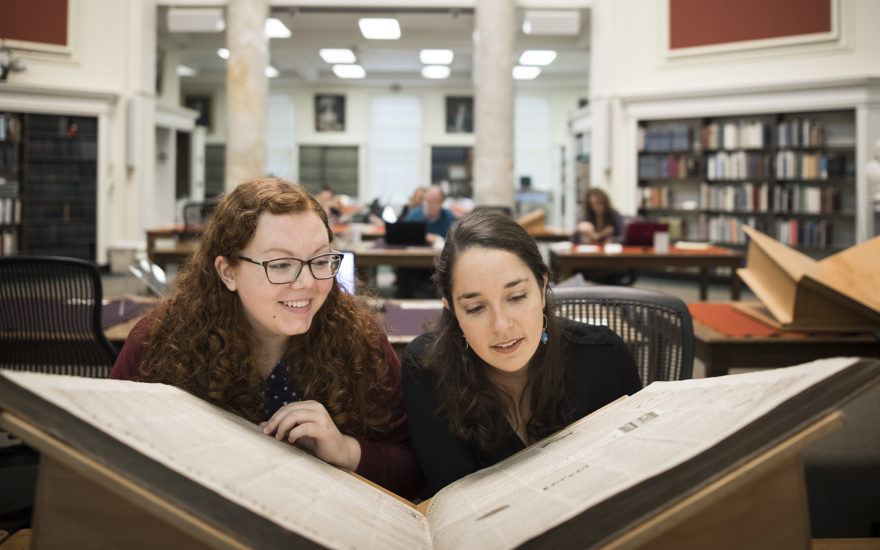Conduct original research within a close-knit community that examines vital connections between literature and culture.
The advanced study of literature at Clark University brings you into deep and sustained engagement with the cultural forces that have shaped societies in the U.S. and around the world.


Why Pursue a Master’s in English at Clark University?
- Earn your M.A. in English in as little as three to four semesters with at least one year of study in residence.
- Conduct original research with close faculty consultation and complete an extended thesis project.
- Connect with New Earth Conversations (an interdisciplinary group devoted to the study of climate and the environment), the Higgins School of Humanities (on-campus events and speakers), the Strassler Center for Holocaust and Genocide Studies, the American Antiquarian Society, and the Center for Gender, Race, and Area Studies.
Our curriculum includes a required introduction to literary studies, as well as elective special-topics seminars in a range of geographical contexts and time periods. Working closely with your adviser, you will identify an area of focus for your thesis research and complete a project that builds on your unique scholarly interests.
Most students earn their degree in three or four semesters. Students must be in residence for at least one year (two years are required for recipients of a teaching assistantship award).
In addition, students must:
- Attend the Departmental Colloquia, a noncredit course in which faculty and students present work in progress, share thesis updates, and hear guest speakers.
- Successfully complete an oral defense of their thesis before two or more faculty readers.
3 to 4 semesters over 1.5 to 2 years
8 course units
- 2 core courses
(Introduction to Graduate Studies and a thesis course) - 6 electives
The experience of studying in courses at the graduate level — along with researching, writing, and defending a thesis — prepares you effectively for many professions. Our graduates have gone on to prestigious doctoral programs and careers in journalism, communications, and print and visual media.
Recent graduates have moved on to a wide spectrum of academic and employment opportunities, including:
- Doctoral programs in related fields.
- Jobs in secondary education.
- Jobs in nonprofit and corporate settings, working in publishing, marketing, digital media, social work, management, marketing, law, and other areas.
- The Book in the Early Modern World
- Reading Voraciously: Food and Literature in the 20th Century
- Ecologies in Crisis: Literature and Environment
- Shakespeare and Race
- Making Gender through the Eighteenth-Century Novel
- Fictions of Empire: Studies in Global English Literature
- Ethnic America: Literary and Theoretical Perspectives
- Special Topics in African American Literature
- Queer Modernisms
- Traumatic Tales: National Trauma in Romantic Literature
- Toni Morrison
- Fictions of Asian America
Ph.D. Candidate
Jobs in Secondary Education, Publishing, Marketing, Digital Media, Social Media, Management, and Law
Teacher
Indonesia
Academic Adviser
Independent School
Head Coach, Women’s Ice Hockey
Nichols College
“This program has enhanced my critical thinking and analytical skills, and the verbal and written communication skills I’ve learned are directly transferable to my career coaching college hockey.
— William Brown, M.A. ’18
Frequently Asked Questions
What skills will I learn in English?
Our students engage capacities and skills that have import within and beyond the study of literature. Such skills entail:
- Analyzing both written texts and broader cultural narratives that shape the political and social world.
- Crafting insightful and illuminating arguments.
- Conducting independent and in-depth research with a range of archival sources.
Faculty research areas
Academic Excellence. Global Reach. Career Success.
Join our supportive community of scholars. Ready to take the next step?








